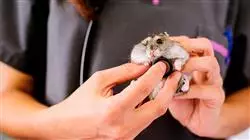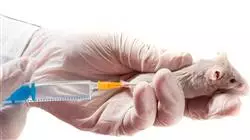University certificate
The world's largest faculty of veterinary medicine”
Introduction to the Program
Exotic pet owners are demanding veterinarians specialized in this type of patient, so it is becoming a booming profession with high demand"

The Postgraduate Diploma in Exotic Mammals is a high quality training program that focuses on the study of the main pathologies, diagnostic techniques and treatments of lagomorphs, ferrets and rodents.
The rise in popularity of rabbits and rodents as pets is due, in part, to the gentle and intelligent nature of these animals, as well as the low demand for attention required by owners who, despite this, are rewarded with affection comparable to that which they would receive from traditional pets such as dogs and cats.
Rabbits and rodents are the third most frequently seen pets in veterinary clinics for various health problems. This circumstance, together with the doubts that professionals have when caring for them and diagnosing their ailments, has inspired this advanced Postgraduate Diploma on the most complex aspects of the same.
Ferrets, on the other hand, are very active animals, independent, very funny, real explorers..., but they require a very attentive care to avoid accidents. They are very good pets, but they must be gradually accustomed to be handled to avoid bites.
On the other hand, squirrels, hedgehogs or even Vietnamese pigs are animals that have also gained a place in some homes, although in the case of the pig, it is currently considered an invasive species and its sale and purchase as a pet has recently been banned. The emergence of all these species as companion animals has led to an evolution in the way pets are treated. Beyond the traditional pets (dog and cat), these species need more personalized treatments and differences, due to their own physical characteristics, so it is necessary to have veterinarians specialized in exotic mammals that can take care of these animals with the maximum possible safety and successful results.
This Postgraduate Diploma provides students with specific tools and skills to successfully develop their professional activity in the wide field of exotic animals. It addresses key competencies such as knowledge of the reality and daily practice of the veterinary professional, and develops responsibility in the monitoring and supervision of their work, as well as communication skills within the essential teamwork.
In addition, as it is an online diploma, the student is not constrained by fixed schedules or the need to move to another physical location, but can access the contents at any time of the day, balancing their work or personal life with their academic life as they wish.
Do not miss the opportunity to do this Postgraduate diploma in Exotic Mammals with us. It's the perfect opportunity to advance your career"
The Postgraduate diploma in Exotic Mammals contains the scientific most complete and up-to-date educational program on the market. The most important features of the program include:
- The development of case studies presented by experts in Exotic Mammals
- The graphic, schematic, and eminently practical contents with which they are created provide scientific and practical information on the disciplines that are essential for professional practice
- The latest news on the diagnosis and treatment of diseases in Exotic Mammals
- Practical exercises where the self-assessment process can be carried out to improve learning
- A special emphasis on innovative methodologies in the field of the diagnosis and treatment of diseases in exotic mammals
- Theoretical lessons, questions to the expert, debate forums on controversial topics, and individual reflection assignments
- Content that is accessible from any fixed or portable device with an Internet connection
This Postgraduate diploma is the best investment you can make when choosing a refresher programme to expand your existing knowledge in Exotic Mammals ”
Its teaching staff includes professionals from the veterinary field, who bring the experience of their work to this training, as well as recognised specialists from leading societies and prestigious universities.
The multimedia content, developed with the latest educational technology, will provide the professional with situated and contextual learning, i.e., a simulated environment that will provide immersive training programmed to train in real situations.
This program is designed around Problem Based Learning, whereby the specialist must try to solve the different professional practice situations that arise during the academic year. For this purpose, the professional will be assisted by an innovative interactive video system created by renowned and experienced experts in exotic animals.
This training comes with the best didactic material, providing you with a contextual approach that will facilitate your learning"

This 100% online Postgraduate diploma will allow you to combine your studies with your professional work while increasing your knowledge in this field"
Why study at TECH?
TECH is the world’s largest online university. With an impressive catalog of more than 14,000 university programs available in 11 languages, it is positioned as a leader in employability, with a 99% job placement rate. In addition, it relies on an enormous faculty of more than 6,000 professors of the highest international renown.

Study at the world's largest online university and guarantee your professional success. The future starts at TECH”
The world’s best online university according to FORBES
The prestigious Forbes magazine, specialized in business and finance, has highlighted TECH as “the world's best online university” This is what they have recently stated in an article in their digital edition in which they echo the success story of this institution, “thanks to the academic offer it provides, the selection of its teaching staff, and an innovative learning method aimed at educating the professionals of the future”
A revolutionary study method, a cutting-edge faculty and a practical focus: the key to TECH's success.
The most complete study plans on the university scene
TECH offers the most complete study plans on the university scene, with syllabuses that cover fundamental concepts and, at the same time, the main scientific advances in their specific scientific areas. In addition, these programs are continuously being updated to guarantee students the academic vanguard and the most in-demand professional skills. In this way, the university's qualifications provide its graduates with a significant advantage to propel their careers to success.
TECH offers the most comprehensive and intensive study plans on the current university scene.
A world-class teaching staff
TECH's teaching staff is made up of more than 6,000 professors with the highest international recognition. Professors, researchers and top executives of multinational companies, including Isaiah Covington, performance coach of the Boston Celtics; Magda Romanska, principal investigator at Harvard MetaLAB; Ignacio Wistumba, chairman of the department of translational molecular pathology at MD Anderson Cancer Center; and D.W. Pine, creative director of TIME magazine, among others.
Internationally renowned experts, specialized in different branches of Health, Technology, Communication and Business, form part of the TECH faculty.
A unique learning method
TECH is the first university to use Relearning in all its programs. It is the best online learning methodology, accredited with international teaching quality certifications, provided by prestigious educational agencies. In addition, this disruptive educational model is complemented with the “Case Method”, thereby setting up a unique online teaching strategy. Innovative teaching resources are also implemented, including detailed videos, infographics and interactive summaries.
TECH combines Relearning and the Case Method in all its university programs to guarantee excellent theoretical and practical learning, studying whenever and wherever you want.
The world's largest online university
TECH is the world’s largest online university. We are the largest educational institution, with the best and widest online educational catalog, one hundred percent online and covering the vast majority of areas of knowledge. We offer a large selection of our own degrees and accredited online undergraduate and postgraduate degrees. In total, more than 14,000 university degrees, in eleven different languages, make us the largest educational largest in the world.
TECH has the world's most extensive catalog of academic and official programs, available in more than 11 languages.
Google Premier Partner
The American technology giant has awarded TECH the Google Google Premier Partner badge. This award, which is only available to 3% of the world's companies, highlights the efficient, flexible and tailored experience that this university provides to students. The recognition as a Google Premier Partner not only accredits the maximum rigor, performance and investment in TECH's digital infrastructures, but also places this university as one of the world's leading technology companies.
Google has positioned TECH in the top 3% of the world's most important technology companies by awarding it its Google Premier Partner badge.
The official online university of the NBA
TECH is the official online university of the NBA. Thanks to our agreement with the biggest league in basketball, we offer our students exclusive university programs, as well as a wide variety of educational resources focused on the business of the league and other areas of the sports industry. Each program is made up of a uniquely designed syllabus and features exceptional guest hosts: professionals with a distinguished sports background who will offer their expertise on the most relevant topics.
TECH has been selected by the NBA, the world's top basketball league, as its official online university.
The top-rated university by its students
Students have positioned TECH as the world's top-rated university on the main review websites, with a highest rating of 4.9 out of 5, obtained from more than 1,000 reviews. These results consolidate TECH as the benchmark university institution at an international level, reflecting the excellence and positive impact of its educational model.” reflecting the excellence and positive impact of its educational model.”
TECH is the world’s top-rated university by its students.
Leaders in employability
TECH has managed to become the leading university in employability. 99% of its students obtain jobs in the academic field they have studied, within one year of completing any of the university's programs. A similar number achieve immediate career enhancement. All this thanks to a study methodology that bases its effectiveness on the acquisition of practical skills, which are absolutely necessary for professional development.
99% of TECH graduates find a job within a year of completing their studies.
Postgraduate Diploma in Exotic Mammals
It is common knowledge that, within the world of pets, the various canine and feline breeds are the common denominator. What is perhaps often left out of veterinary considerations are the particular specimens that belong to the lagomorphs, mustelids and rodents that can also be pigeonholed as pets. The Postgraduate Diploma in Exotic Mammals designed by TECH Global University aims precisely to scrutinize the characteristics and habits of this part of the fauna in order to treat their ailments and diseases under the highest quality standards. Through our broad curriculum you will be versed in a whole range of basic skills such as sample taking and analysis, drug dosage, pathologies and alterations of the organism, as well as the most advanced surgical techniques on which the survival and full development of the patient may depend.
Peculiar Pets: the added value to your career
The online education components at our disposal will not only provide you with a clear, precise and replicable understanding of your own experience, but will also add to your resume skills and abilities that are highly valued in specialized animal medicine centers, farms and organizations that manage parks and nature reserves where there is usually a large population of this peculiar fauna. The four modules that make up our program, endorsed by experienced academics in the field and complemented by fruitful interactive material, will broaden your horizons towards a spectrum of veterinary applications as fascinating as it is useful. Do you want to know how to vaccinate a squirrel, perform an ultrasound on a ferret or administer a placebo to the gastrointestinal system of a hedgehog? With TECH you have the opportunity to access this privileged knowledge that will propel your career to unprecedented success.







